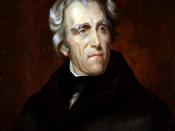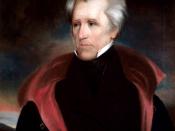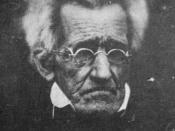The political faction we call the Jacksonian Democrats feel that certain things
about them are nothing but true. These ideas about themselves are that they are the
guardians of the United States Constitution, of political democracy, of individual liberty
and of equality of economic opportunity. The ideas possessed by the Jacksonian
Democrats are nothing short of true because Andrew Jackson did many good things while
in office for his eight years. He made the most of his time, and he reformed a nation that
was growing old in its ideas at a very young age.
Andrew Jackson knew how to stick up for the Constitution, our nation's backbone,
when South Carolina decided it did not need to follow the laws set by Congress. The
Nullification Act was South Carolina's way of being independent while a part of a whole
country. 'Old Hickory' would not stand for this disobedience by this rebel state, and while
Henry Clay tried to help by lessening the tariff, a move which did not work to appease
South Carolina, Jackson stepped up and told South Carolina that they were not to disobey
this federal tariff.
This was a tariff that every other state had to go along with, so this state
had to as well. The tough-as-nails Jackson stated that blood was not to be shed over this,
or he personally, a war hero before his current job, would take off for South Carolina and
hang the first troublemaker on the first tree he could find. While it took a compromise of a
ten-year reduction period on the tariff that would put it as low as 20 percent, Jackson
made his point of where he would stand on such Constitutional matters.
When he was elected into office, Andrew Jackson swept through the White House
with a bunch of reforms on how to govern. Some of these reforms included rotating the
positions in office. This was his system of rewarding those who helped him get elected;
what became known as the spoils system. In his attempt to get more people involved in
the political process, he had Universal Manhood Suffrage passed. You no longer needed
to be a white, land-owning man to vote, but you still had to be a man. He also was the first
president to have a Cabinet, which was called the 'Kitchen Cabinet,' but only because it
met in the kitchen of the White House.
Individual liberty can be easily seen in a reading of Harriet Martineau's 'Society in
America.' Under Andrew Jackson, Americans were leading their own lives, and while they
were not all total success stories, the fact that remains is that they were independent.
These people, whom Martineau expected to be in poverty, were full functioning persons,
living in cities and towns, debating whether the government was the right form for them.
When confronted with the issue of rechartering the national bank, Andrew Jackson
knew what he had to do. Being the man he was, he could not do something that would
help add to the monopoly that this national bank was becoming. The largest group of
beneficiaries were British investors, and he felt that the balance of power in the national
bank, which was not very equally appointed, was too irresponsible for this country. To
veto the rechartering of the bank was showing that he cared for the opportunity to make
the economy stronger and better. If all the money is in the hands of a few, what do the rest
have?
You might think that the Jacksonian Democrats had a high opinion of themselves
but the truth of the matter is what they said they were was true. They really were
guardians of the Constitution, the guardians of political democracy, the guardians of
individual liberty, and the guardians of equality of economic opportunity. Andrew Jackson
stood up for what was right, yet he seemed to stand up for everybody and everything at
the same time. Who else could possibly defend the Constitution and the liberty of
individuals at the same time?


